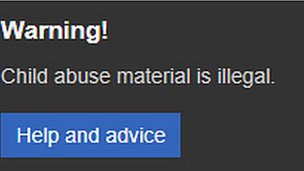Image via isak55/Shutterstock
Microsoft’s search engine Bing has become the first to introduce warnings that will appear when blacklisted search terms related to child abuse are entered online. The move follows pressure UK Prime Minister David Cameron has placed on internet service providers (ISPs) and search engines to help stop such content from spreading online. The warning will only apply in the UK.
The warning introduced by Bing notifies users that the content searched for is illegal and also includes a ‘Help and advice’ button, which will link users to counselling services, such as Stop It Now.
The terms that will trigger these pop-ups come from a blacklist compiled by the Child Exploitation and Online Protection Centre (CEOP). This blacklist can’t possibly cover every term these users will search for, but it is hoped the warnings will deter some users from engaging further with this activity.
“While the Bing project isn’t the whole solution, I hope it goes some way to making those who are curious about searching for indecent images think again,” CEOP deputy chief executive Andy Baker told BBC News.
A Microsoft spokesperson explained these new measures come in addition to the company’s existing policy of removing this kind of illegal content from Bing as soon as possible. “Microsoft has been, and remains, a strong proponent of proactive action in reasonable and scalable ways by the technology industry in the fight against technology-facilitated child exploitation,” he said. “We have teams dedicated globally to abuse reporting on our services and the development of new innovations to combat child exploitation more broadly.”

The pop-up notification that is triggered by blacklisted search terms on Bing
Cameron’s crackdown
Last week, Cameron announced his plans to crack down on images of child abuse and rape on the internet, as well as a proposal that ISPs introduce filters blocking online pornography by default, serving this kind of content only to users that specifically request it.
By bringing the wider scope of online pornography to the mix, Cameron’s proposal raises many questions, many of which have been asked by University of East Anglia Law School lecturer Paul Bernal. Some organisations have called for the Irish Government to follow the UK’s lead while others say the responsibility should not be wholly left with the ISPs and search companies.
Other measures to be introduced include the establishment of a UK and US taskforce to tackle the problem, the creation of a single secure database of illegal images for use by the entire UK police force, and the criminalisation of possession of online pornography depicting rape in England and Wales, in line with Scotland.
October deadline for search engines
What Cameron wants from search engines like Bing and Google is that they will not provide pathways to illegal images. He has proposed that blacklisted terms bear no direct search results. He has also declared that he is exploring legislative action that can be taken where search operators refuse to comply.
A meeting between the prime minister and representatives from the top search engines will be held in October, at which Cameron expects a progress report on how they are addressing this problem.
Yahoo!, which is powered by Bing, is said to be considering a similar move while Google will continue to enforce its zero-tolerance policy and purpose-built technology to prevent this material from appearing in search results.
Search image by isak55 via Shutterstock